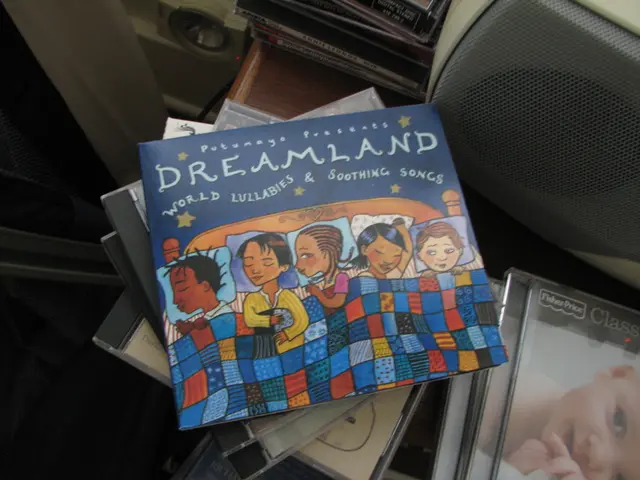The Science Behind Shiver-Inducing Tunes: An Insight into the Brain's Reaction to Certain Music and Its Chemical Implications
You're cranking up the volume, ready to lose yourself in the rhythm and notes flowing out from the speakers. Suddenly, a chill of goosebumps creeps up your arms, betrays a lump in your throat, or sends shivers down your spine. It's an incredible feeling, one that many people cherish and seek out. It's a musical chill, and it's no mere coincidence—it's a complex neurological response.
Here's the lowdown on why some songs trigger these goosebumps, what goes on in your brain when it happens, and how this mystifying sensation is connected to your emotional, cognitive, and attentional processes.
The Scoop on Those Shivers
Musical chills—also known as "frisson," "skin orgasms," or just "the chills"—occur when you experience a shivering response to emotionally impactful music. These goesbumps are more than poetic emotion; they're a physical response in your brain and body.
When music strikes a chord, here's what happens:
- Powerful Emotional Centers: Your brain ignites various centers dedicated to emotional intensity, pleasure, and memory when music sends shivers down your spine. Key areas include the nucleus accumbens, the amyggdala, and the prefrontal cortex.
- Connectivity Overdrive: Studies using FMRI scans show that chill-prone listeners have stronger connections between these areas, especially between the auditory processing regions and the reward system.
In essence, your brain picks up on something meaningful, makes a mental prediction about what will unfold next, and then enjoys a delightful surprise when the music delivers. This surprise triggers a burst of dopamine, and voilà—you feel the fits of shivering pleasure.
Who Feels the Chills?
Not everyone experiences musical chills, but certain tendencies are shared among those who do:
- Sensitivity: Chill-prone listeners often score higher on openness to experience, a personality trait linked to imagination, emotionality, and aesthetic sensitivity.
- Training: A background in music or an active engagement with music can play a role in whether or not someone gets chills.
- Empathy: Emotional empathy and the capacity for deep absorption are common traits among individuals who get chills.
These traits may explain why certain listeners have more cross-talk between emotional and auditory brain regions. Instead of just picking up on the sounds, they simulate the emotional component of the music.
What Types of Tunes Get Those Chills?
Every soul has its favorite genres, but certain types of music are more likely to provoke goosebumps:
- Unexpected Twists: Sudden changes in harmony, chords, volume, or moments of silence can trigger goosebumps.
- Emotional Delivery: Vocals that pour raw emotion into a tune can elicit chills. Think of Adele, Freddie Mercury, or Billie Eilish when they hit those soulful notes.
- Dramatic Tension: Efficient use of tension and release in music can induce chills, creating anticipation and release.
The Evolutionary Enigma: Why on Earth Do We Get Chills from Music?
From an evolutionary perspective, musical chills don't seem to make much sense. They don't appear to aid survival or reproduction directly. Yet, there are a few theories that try to unravel the mystery:
- Emotional Bonding: Music chills could be an emotional glue that reinforces group cohesion and empathy by promoting shared emotional peaks.
- Neurological Surprises: Chills could be a byproduct of our predictive brain architecture—a reward we feel when our brain's predictions are confirmed or exceeded during surprising, emotional moments.
How Music Chills Say Something About Your Brain Health
Think of musical chills as a mental wellness indicator:
- Emotional Awareness: Individuals with emotional awareness and higher sensitivity to music are more likely to experience chills, which can signify mental well-being.
- Healthy Dopamine Signaling: Studies show that musical chills are tied to healthy dopamine signaling, which is associated with feelings of reward and pleasure.
- Mood Disorders: Reduced musical chills can be a symptom in certain mood disorders, such as depression.
While not intended as a clinical tool, your sensitivity to music can offer insights into your brain's emotional vitality, reward responsiveness, and integrative capacity.
Can Nootropics Help Enhance Emotional and Sensory Processing?
No nootropic will transform a run-of-the-mill tune into a masterpiece, but certain supplements can support the brain systems involved in emotional engagement and focus:
- Citicoline: Supports cognitive performance and neural energy, helping you maintain engagement with emotional content.
- L-theanine: Promotes relaxed alertness, allowing for better absorption of emotional nuances without anxiety.
- Rhodiola Rosea: Helps manage emotional stress, ensuring clear perception and emotional resilience.
Though not directly increasing your chances of chills, these supplements can optimize your brain's ability to engage with emotionally rich content, be it music, art, or conversation.
How to Invite More Chills into Your Life
Got goosebumps on the brain? Here are some tips to cultivate more chill-sparking experiences:
- Dive Deep into Memories: Revisit music from your formative years or songs tied to meaningful moments. Nostalgia amplifies emotional responses.
- Focus and Immerse: Make listening a mindful activity. Avoid multitasking, and just, you know, surrender to the music.
- Use High-Quality Audio: Quality matters. Dynamic range, subtle harmonics, and the energy of a live performance can all impact the emotional impact of the music.
- Branch Out: Try out new genres that push your limits; a new experience can trigger novelty-based chills.
- Embrace Emotions: Let music move you. Read the lyrics, reflect on your feelings, and don't be afraid to let it all out.
Musical Chills Aren't Just Entertainment—They're Integration
When music sends the shivers down your spine, it's more than just background noise. It's your brain bringing together emotion, memory, beauty, and attention, expressing, "This matters."
In a world that can sometimes feel cold and fragmented, music's ability to move us, to touch us, to connect us—it's one of life's most beautiful, mysterious gifts.
- Musical chills, also known as frisson or skin orgasms, are a physical response in the brain and body triggered by emotionally impactful music, as your brain ignites various emotional centers like the nucleus accumbens, amyggdala, and prefrontal cortex.
- Studies show that individuals who get musical chills have stronger connections between these areas, particularly between the auditory processing regions and the reward system, causing a burst of dopamine and resulting in a fitting of shivering pleasure.
- Certain personality traits, such as being sensitive, having a background in music, or being highly empathetic, are more commonly shared among those who experience musical chills.
- Sudden changes in harmony, chords, volume, or moments of silence, emotionally charged vocals, and dramatic tension can all make music more likely to provoke goosebumps.
- From an evolutionary perspective, musical chills might promote shared emotional peaks and cohesion within groups, or be a byproduct of our predictive brain architecture.
- Musical chills can serve as an indicator of brain health, signifying emotional awareness, healthy dopamine signaling, and mental well-being, but reduced chills can be a symptom of certain mood disorders, such as depression.
- Certain supplements, such as citicoline, L-theanine, and Rhodiola Rosea, can support the brain systems involved in emotional engagement and focus, potentially enhancing the experience of emotionally rich content like music.








